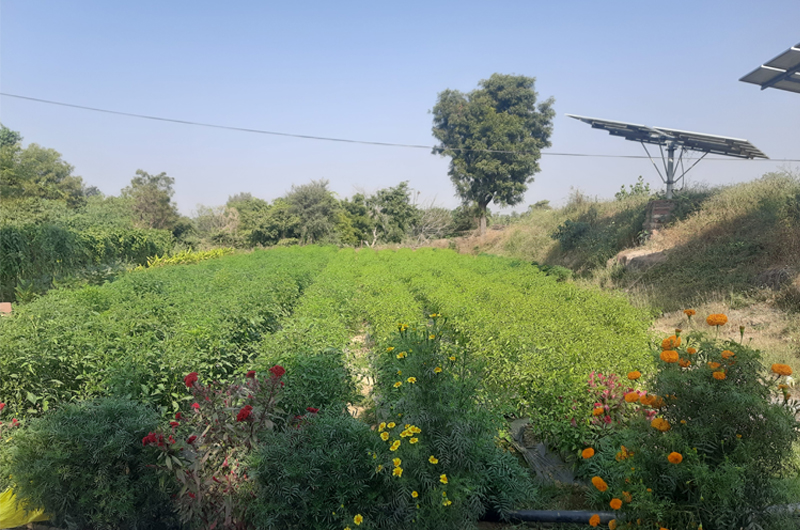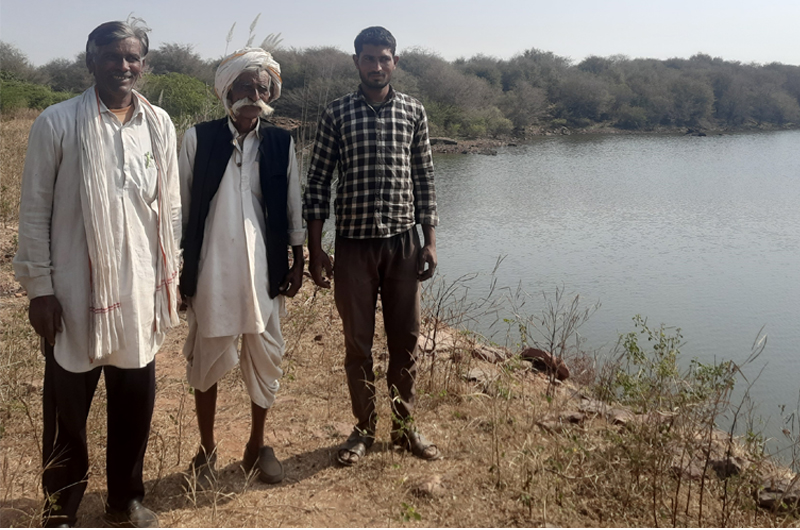Voluntary organisations are doing yeoman service in improving the cultivability of land and promoting natural farming. Bharat Dogra visits two villages in Rajasthan’s Karauli District which are benefitting from such measures. In this case, voluntary organisation SRIJAN mobilised community members to help improve and deepen water sources. Natural farming practices improved sustainability and reduced expenses. What’s more, the organisation also helped villagers to gain access to various government development schemes
Makanpurswami Village in Mandrayal Block of Rajasthan’s Karauli District is a rocky area known for stone mining. The flip side is that cultivation here has been adversely affected to an extent. When water became increasingly scarce, most farmers were unable to cultivate a significant part of their lands, while the yield from the cultivable portions was not commensurate with the soaring expenses.
In light of the situation, farmers from Makanpurswami and neighbouring villages took a significant initiative based on self-help – they collected small donations from within the community to conserve rainwater at a suitable location and ensure better water availability for agriculture. But though the situation did improve to some extent, the one-time small effort could not make any significant or lasting impact.
Representatives of voluntary organisation SRIJAN (Self-Reliant Initiatives for Joint Action) came in contact with the village and, recognising its potential for taking up development work with unity and cooperation, mobilised community members to meet the goal. SRIJAN helped improve and deepen water sources. With efficient de-silting, not only did the water supply improve, the highly fertile silt proved a boon for farming. With its technical skills, SRIJAN helped build better bunds on farms and helped level uneven ground.

In the course of work, it became clear that the farmers had a rich understanding of local conditions, but resources were lacking to help them improve their farms and the village at large. SRIJAN could provide both resources and technical expertise, and its activists had the ability to establish close bonds with and within the community for the betterment of the people as a whole. Even during the relatively short time I spent at the village, I could see the affection the villagers had for SRIJAN members, led by Bhavani Singh.
A working model has been created, in which farmers share some of the costs of improvement work while SRIJAN provides a bigger share of the resources. The organisation has also introduced natural farming practices which improve sustainability and reduce expenses. In addition, SRIJAN helped villagers to have better access to various government development schemes. Government officials on their part were happy to get SRIJAN’s help in ensuring that schemes like the one to provide solar pumps were better implemented and yielded more encouraging results.
Farmer couple Ballabh and Vimla have been at the forefront of these initiatives. Vimla points to their lush green farm of diverse vegetables and says, “Look at how these green plants are smiling! This was rocky abandoned land earlier.” Ballabh adds, “A lot of fertile silt had to be deposited here to make this wonderful transformation happen. This wouldn’t have been possible without the help of SRIJAN.” They have also increasingly adopted natural farming methods and have set up a bio-resource center where they prepare bio-fertilisers and pest repellants.
Maan Singh is another farmer who participates in natural farming efforts enthusiastically. He says initially, yield may decline but after some time it recovers. In addition, there is the definite advantage of not needing to buy expensive chemical fertilisers and pesticides. The subsidised solar pump has also cut the expenditure on diesel for lifting water, he notes.
Farmers here mention many-sided gains, but the biggest source of their happiness is the fact that land which they had almost written off as infertile had not only become cultivable, but were actually giving good and healthier yields. The wheat that Ballabh and Vimla grow commands almost one-and-a-half times the normal rate, as it is a healthier option.

Teen Pokhar Village, located in the same block, has drawbacks similar to those of Makanpurswami. Some voluntary organisations have come forward to create or repair water structures in the village. SRIJAN, which has taken the lead in these efforts recently, has created eight new ponds and helped improve 18 existing ones. The work is being taken up with close community involvement so that the most appropriate sites are selected and other technical work is done correctly. Natural farming has also been promoted here.
SRIJAN has helped farmers avail of government schemes for solar pumps. I noticed how farmers in the village are taking steps to cultivate land they had earlier given up on, a testimony to the fact that the efforts of voluntary organisations are paying off. It is also to be noted that the development initiatives in the two villages, supported financially by the Standard Chartered Bank, are in tune with climate change mitigation and adaptation.
(The writer is a senior freelance journalist and author who has been associated with several social movements and initiatives. He lives in New Delhi.)



 from Webdoux
from Webdoux